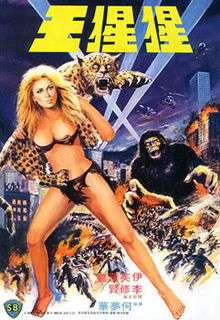The Mighty Peking Man
The Mighty Peking Man (猩猩王) (Mandarin: Xingxing Wang - which translates to "Gorilla King" in English) is a 1977 monster film produced by Shaw Brothers Studio to capitalize on the craze surrounding the 1976 remake of King Kong. The film was originally released in the United states with the English dub in 1980 as Goliathon.[4]
| Utam:King of the Orangutans (The Mighty Peking Man) | |
|---|---|
 Hong Kong theatrical release poster featuring Evelyne Kraft | |
| Directed by | Ho Meng-hua |
| Produced by | Runme Shaw |
| Written by | Kuang Ni |
| Starring | Danny Lee Evelyne Kraft Hsiao Yao Ku Feng Lin Wei-tu |
| Music by | Frankie Chan |
| Cinematography | Tsao Hui-chi Wu Cho-hua |
| Edited by | Chiang Hsing-Lung |
Production company | |
| Distributed by | Shaw Brothers Studio |
Release date |
|
Running time | 90 minutes |
| Country | Hong Kong |
| Language | Mandarin |
| Budget | HKD 6,000,000/$1,000,000 USD[2](estimated) |
| Box office | $17,368[3](1999 North American re-release) |
The film was directed by Ho Meng Hua and produced by Runme Shaw; the special effects were directed by Sadamasa Arikawa, with Koichi Kawakita as assistant FX director, who would move on to the Heisei Godzilla movies and the Heisei Gamera trilogy]. It starred Danny Lee and Evelyne Kraft.
Plot
A party from Hong Kong headed up by Johnny (Danny Lee) are exploring the Indian side of the Himalayan mountains and discover the eponymous Peking Man, a Yeti, along with a beautiful blonde wild woman named Samantha (Evelyne Kraft) whose parents had been killed in a plane crash. Samantha was raised by Utam (the Peking Man) with nothing to wear but an animal-skin bikini. Like Tarzan, she has learned both to swing through the trees on vines and to communicate with and command the jungle animals, with the exception of a venomous snake who bites her on the inner thigh, requiring the hero Johnny to suck out the poison while Samantha's leopard friend and Utam fight the snake. Shortly thereafter, they fall in love.
Johnny and his partners bring Samantha and Utam to Hong Kong, where Utam goes on display to the incredulous public. While in Hong Kong, Samantha doesn't seem to prefer women's clothing and continues to wear her animal-skin bikini. Johnny, meanwhile, reconciles with the girlfriend whose romantic betrayal with his brother had been the impetus behind his sudden decision to explore the Himalayas. Samantha sees this and runs off, nearly getting raped. Utam goes berserk and squashes the rapist. During Samantha's running, Utam ends up on a rampage. Utam then goes to the tallest building he can find (namely the Jardine House), and climbs it. Johnny and Samantha catch up to Utam and plan to get him out of Hong Kong and back to their jungle. Utam is burned/shot to death by several helicopters in a scene greatly reminiscent of the ending of Kong, and falls off. Samantha is seemingly killed in an explosion during the conflict while Johnny receives a minor gunshot wound to the lower leg.
Cast
- Danny Lee - Johnny Feng
- Evelyne Kraft - Samantha
- Ku Feng - Lu Tien
- Lin Wei-tu - David Chen
- Norman Chu - Ah Lung
- Wu Hang-sheng - Ah Pi
- Hsiao Yao - Huang Tsui-Hua
- Chen Ping - Lin Chang
- Ted Thomas - Commissioner
- Steve Nicholson - Commissioner's aide
Production
The Mighty Peking Man had a budget of six million Hong Kong dollars for the Shaw Bros. studio.[1] The film took over a year to complete and was shot in Mysore, India.[1]
Release
The Mighty Peking Man was distributed by Shaw Bros. in Hong Kong.[1]
Reception
Variety reviewed a 100 minute long Cantonese-language version of the film stating it was an "interesting if not unique Hongkong-made escapist entertainment for the inquisitive middle-of-the-roaders audience of other countries." and "it is high camp, chinese style and for this reason it just might make it in less demanding markets."[1]
In retrospective reviews, Roger Ebert gave the film three stars out of a possible four in the Chicago Sun-Times, and, incidentally, actually upgraded his rating for the thematically similar Infra-Man:
"Mighty Peking Man is very funny, although a shade off the high mark of Infra-Man, which was made a year earlier, and is my favorite Hong Kong monster film. Both were produced by the legendary Runme Shaw, who, having tasted greatness, obviously hoped to repeat. I find to my astonishment that I gave Infra-Man only two and a half stars when I reviewed it. That was 22 years ago, but a fellow will remember a lot of things you wouldn't think he'd remember. I'll bet a month hasn't gone by since that I haven't thought of that film. I am awarding Mighty Peking Man three stars, for general goofiness and a certain level of insane genius, but I cannot in good conscience rate it higher than Infra-Man. So, in answer to those correspondents who ask if I have ever changed a rating on a movie: Yes, Infra-Man moves up to three stars.[5]
Footnotes
- Willis 1985, p. 321: "Review is of a Cantonese-language 100 minute version viewed in Hong Kong on April 10, 1977"
- "Transnational Horror Cinema:Bodies of Excess and the Global Grotesque". books.google.com. Retrieved 10 May 2020.
- "The Mighty Peking Man". boxofficemojo.com. Retrieved 4 May 2020.
- "Mighty Peking Man-From the Grindhouse Cinema Database". grindhousedatabase.com. Retrieved 10 May 2020.
- Ebert, Roger (30 April 1999). "Mighty Peking Man". rogerebert.com. Retrieved 31 January 2016.
References
- Willis, Donald, ed. (1985). Variety's Complete Science Fiction Reviews. Garland Publishing Inc. ISBN 978-0-8240-6263-7.CS1 maint: ref=harv (link)